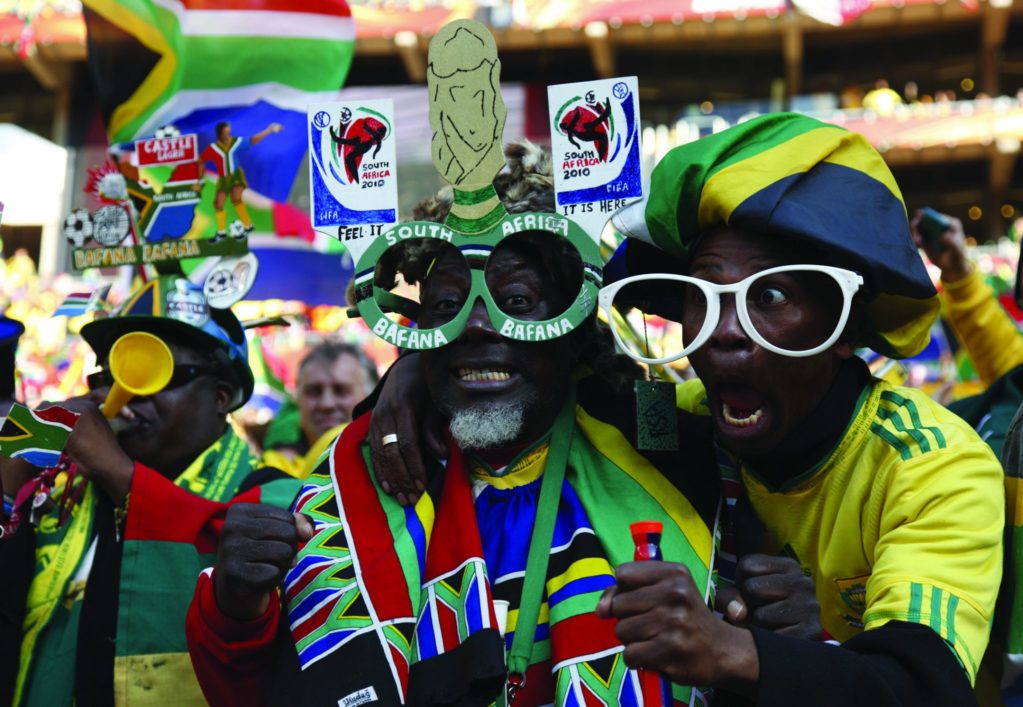Football fans are the same around the world, united by their passion for their team and their love of the beautiful game. But in Africa those passions run extremely high and can lead to over-exuberance in a bid to portray their undying love.
Millions across Africa dream of being a professional footballer, but few make it. The rest must show their love of the game from the stands. This takes form in many ways, from singing songs, painting entire bodies, blowing a vuvuzela, dressing up in colorful garb to the non-stop beat of drums.
While fans in Europe carry banners and chant their support for their side, in Africa the displays are more interesting.
In most cases, there is harmony among opposing fans, which is a particular trait of the African game. If you have ever ventured to high-profile derbies such as Nkana vs. Power Dynamos in Zambia, Kaizer Chiefs vs. Orlando Pirates in South Africa or Asante Kotoko vs. Hearts of Oak in Ghana you will find opposing fans getting along both before and after the match. This is what I love about African supporters. If, on the highest stage, only one African team remains, as was the case at the 2010 World Cup in South Africa with Ghana, the entire continent will support this team. That is African unity.
Recently in Brazil, when finalists Argentina played the World Cup final against Germany, Brazilians were shouting for the Europeans rather than their South American neighbors.
Loading...
Hooliganism in football is on the decrease worldwide but does still exist, largely in Europe and South America. Fans from rival teams attack each other in senseless acts of violence that have nothing to do with football and are usually more a comment on social status and a chance for the ‘ultras’ from each side to flex their muscles.
This is extremely rare in Africa, especially south of the Sahara. North African sides sometimes still have a problem with fan violence which is often politically motivated. There was the recent tragedy in Algeria when Cameroon striker Albert Ebossé Bodjongo was killed by an object thrown by his own supporters as he walked off the field at the end of a game. JS Kabylie had lost the match, despite a goal from Ebossé, and the fan frustration turned deadly.
It is also in North Africa where fans can let the spirit of fair play fall by the wayside. The use of hand-held laser pens to shine into the eyes of opposing goalkeepers and players is widespread and authorities seem powerless to stop it, though it is unclear how much effort they are putting into ending the practice.
How supporters can accept a victory created in such circumstances is beyond me, there is surely no honor in vanquishing an opponent using underhand means. These desperate measures come from the fact that, in some parts of Africa more than others, the club you support says everything about who you are and the status you carry in society.
For example, the Cairo derby between Al Ahly and Zamalek, one of Africa’s greatest rivalries, splits the city along social lines. Zamalek have traditionally held the support of the more affluent, aristocratic section of Cairo, while Al Ahly fans are more working-class. Violence is still common today.
Those are the negatives around fans from the continent, but there is also plenty to enjoy with the way in which Africans attend matches.
Away fans are rare at national team level in African football with the logistical difficulties and expense of travel on the continent. But in club football, where big teams tend to enjoy popular support from around the country, some sides appear to be playing at home every week.
Take Kaizer Chiefs in South Africa as an example, their away games are generally very well supported and the vast majority of fans in the stadium will be supporting AmaKhosi. TP Mazembe of the Democratic Republic of Congo also enjoys support across the country, home and away. In Zambia, Nkana FC, revel in packed stadiums.
This is something quite unique to the African game, as in other parts of the world there would be a large allocation of tickets for home fans only. Away supporters are segregated into small areas of the stadium. But with no segregation needed due to little threat of violence across most of the continent, tickets are sold on the open market and there are certain teams that can rely on fans to come out in numbers wherever they play.
That being said, a lot of teams from Africa are battling to bring in the crowds they once did, except for the so-called big matches. The reason for this is varied, the expense of going to a game being a major factor. Today, there are also a lot more options available for entertainment away from football.
And as ever, the numbers in the stands are reflected in the success on the pitch – people are much more likely to turn up to watch a team on a roll than one struggling for results. That is human nature.
Fans from the African continent are unique and wonderful; they bring a vibrancy and energy to matches. Without them, the game would be poorer.
Loading...
